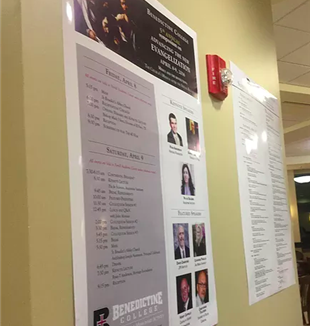
The Gaze of Mercy
How can the Church respond to a “post-Sexual Revolution” society in light of the Jubilee Year of Mercy? This question was the main focus of the 5th annual Symposium on the Advancement of the New Evangelization at Benedictine College in Atchison, Kansas...How can the Church respond to a “post-Sexual Revolution” society in light of the Jubilee Year of Mercy? This question was the main focus of the 5th annual Symposium on the Advancement of the New Evangelization at Benedictine College in Atchison, Kansas.
Theologians, philosophers, and pastors came together to discuss the many facets of this topic, with a hope to understand more fully our call to witness to the life that we have met. The wide array of speakers, coming from different geographical locations and specializing in different areas of work and study, were united by an impassioned desire to share the Beauty that they have encountered in the Church. This desire permeated the writings, discussions, and faces of all the people who were present this weekend.
It became strikingly clear that there was a tension behind this desire, that were they not to share the goodness of what they have met, then it would be less full. The nature of what they have met, the nature of their hearts for that matter, required that it be lived in communion; that it be communicated to others through their being. What is it that can allow us to communicate the original fullness of this beauty, without feeling the need to subject it to our own calculative agenda? Could it be possible to live this beauty without reducing it to mere definitions of morals and values, to communicate it fully through our being, without the anxiety that it is not sufficient on its own? To live this beauty without reducing it to our own calculations and to let it speak for itself implies a risk. And this risk provokes us all to ask ourselves, what is it that has most attracted my freedom? How did I meet this beauty, and through whom did I encounter this original gaze of mercy?
This original relationship is the greatest point of reference as we tackle such multifaceted questions as the one that was addressed this weekend.